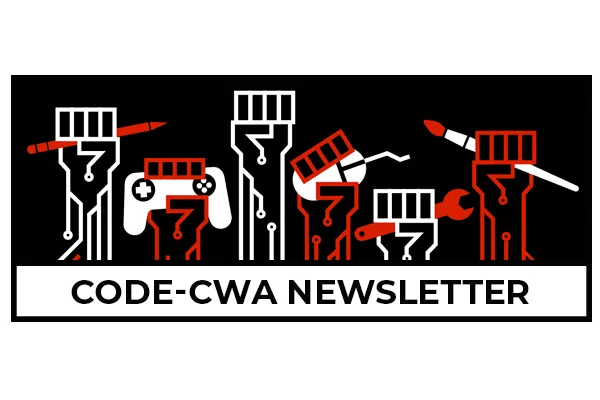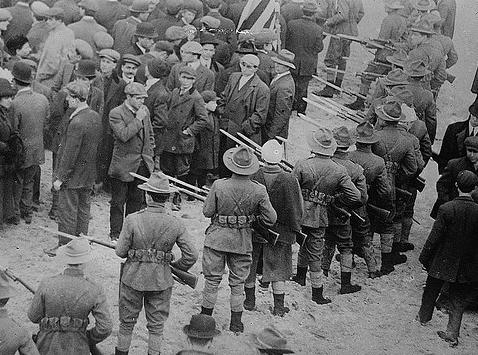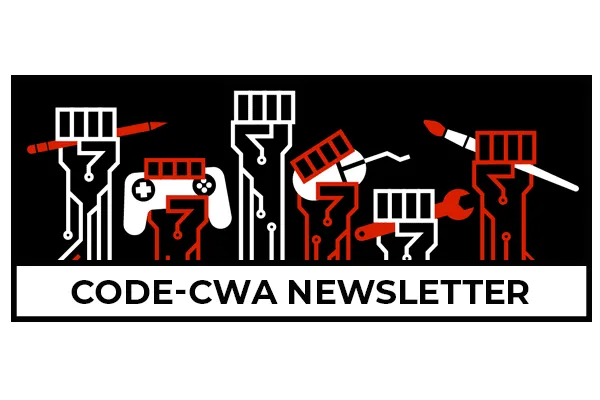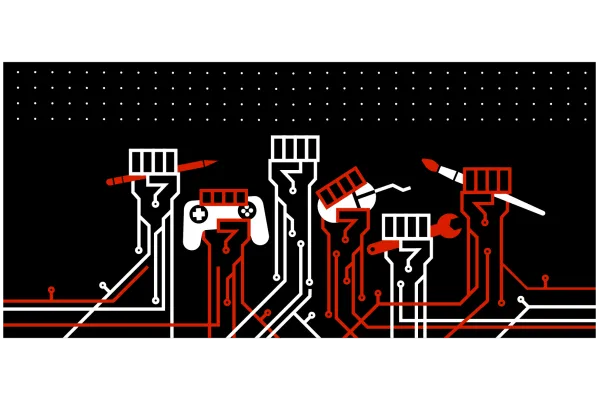CODE-CWA Newsletter: January 29

January is closing with the Alphabet Workers Union growing every week to now over 800 members, NFL players endorsing what could become the first union in Amazon’s history, 75 groups urging Congress to expand access to federal employment protections to app-based workers, and the new Biden administration tapping a gig economy ally, Julie Su, to be the Labor Department’s second in command.
So many hopeful signs and the year has just started.
These developments have not been without their disappointments. As Motherboard reported, Amazon launched a website full of anti-union propaganda targeting Amazon warehouse workers in an effort to derail their upcoming vote to form a union. Under the National Labor Relations Act of 1935, it is illegal for employers to intimidate, retaliate against, or ask workers whether they support a union drive. But union avoidance firms and law firms specialize in crafting rhetoric companies can use to convince workers to vote no in union drives without breaking the law. Similarly, lawmakers and advocacy organizations had been pressing the Biden transition team to nominate their pick Su for Labor Secretary, but it seems they have to settle for her getting second place.
The last few weeks show us that consistent organizing and advocating can impact policy and inspire global change. Through our support of workers across the tech, games, and digital industries we have seen a cultural shift as workers turn to each other to bring the change they seek. This commitment to building democracy in the workplace will impact all of us around the world. Are you looking to organize your workplace? Reach out. We are waiting to organize with you.
Events
This Sunday, you can join our second class in our organizer training series, “Building the Committee,” on January 30 at 12 p.m. PT. You’ll learn how to build a strong organizing committee and how to maintain it so that you have a strong foundation for a successful campaign. Ideally students this is your second class and you’ve started with “Intro to Unions and Organizing,” but it's not required. Enroll online today!
Worker News
 Union organizers talk to Amazon workers when they are stopped at a traffic light outside the warehouse in Alabama.Credit...Bob Miller for The New York Times
Union organizers talk to Amazon workers when they are stopped at a traffic light outside the warehouse in Alabama.Credit...Bob Miller for The New York Times
Amazon is set to have its largest, most viable effort to unionize and it’s led by mostly Black organizers. Amazon has avoided unions throughout its 25-year history, and the union election on February 8 will be one of the first in the company's history. It's not happening in a union stronghold like New York or Michigan, but at an Amazon warehouse in Bessemer, Alabama. The effort to unionize Amazon began last summer during a clandestine meeting. Many of the employees at the Amazon warehouse in Alabama are Black, union organizers are building their campaign around the themes of the Black Lives Matter movement. Leading the organizing effort are about two dozen unionized workers from nearby warehouses and poultry plants, most of whom are also Black. “The pandemic changed the way many people feel about their employers,” said Stuart Appelbaum, the retail union’s president. “Many workers see the benefit of having a collective voice.” After that clandestine meeting in the summer, more than 2,000 workers signed cards indicating they wanted an election. The National Labor Relations Board then determined there was “sufficient” interest in a union election among the warehouse’s roughly 5,800 workers, which is a significant bar to hit with the government agency that oversees the voting process. This will be the first union election involving the company in the United States since a small group of technical workers at a warehouse in Delaware voted against forming a union in 2014. Voting by mail will start in February and continue through March. Read more in The New York Times.
NFL players endorse Amazon Warehouse Workers unionization. The National Football League Players Association (NFLPA), the union that represents more than 2,000 NFL players in the United States, has endorsed the union drive at an Amazon warehouse in Bessemer. On Sunday, the NFLPA released a video on Twitter, where current and former NFL players, discussed the importance of union representation in improving their own wages, benefits, and working conditions, and how a union could do the same for Amazon employees. Read more on Vice.
Activision is resisting diversity hiring push by labor unions: The AFLCIO submitted shareholder proposals requesting that Activision & EA implement a "Rooney Rule" to diversify hiring. In response, Activision is claiming this is "an unworkable encroachment" on the company. Read more on Vice.
Instacart is firing every employee who voted to unionize. The layoffs impact 10 unionized workers at a grocery store called Mariano’s, in addition to other Instacart employees. The group in Skokie, Illinois, a suburb of Chicago, voted to unionize last year with the United Food and Commercial Workers Local 1546 (UFCW). It was a landmark victory for gig workers and represented the first time employees of tech companies that rely predominantly on contract labor have formed a union to collectively bargain for better wages, benefits, and working conditions. Employees were in the process of negotiating their first contract when news of the layoffs hit. “These layoffs are totally discouraging for any gig workers who are trying to do something to make these jobs better,” one unionized worker told Motherboard. UFCW said the layoffs will impact nearly 2,000 of the company’s 10,000 grocery store workers. Read more on The Verge.
The end of the Trump era won’t put a stop to worker organizing: Moira Wiegel and Ben Tarnoff wrote an op-ed in the New York Times this week laying out the history of the tech worker movement and explaining how it’s not going to go away now that Trump is out of office. The work to organize in the tech industry has just begun.
President Joe Biden nominates gig worker rights ally California Labor Secretary Julie Su for the No. 2 position at the US Labor Department. Many progressives had called for her to land the agency’s top job. Su has accepted the White House’s offer of the deputy secretary post. Su has been praised by California unions for advancing organized labor’s priorities, such as efforts to combat employer misclassification of workers as independent contractors. She has also earned high marks among labor leaders and worker advocates over her decades fighting for low-wage and immigrant communities, initially as a civil rights lawyer and for the past 10 years as a state official. Biden intends to choose her as DOL deputy on the heels of tapping Boston Mayor Marty Walsh to helm the department as labor secretary. Earlier in the selection process, Su had been reluctant to serve as second-in-command, as Asian-American lawmakers and advocacy organizations pressed the Biden transition team to nominate her as secretary instead of Walsh. The California business community also has expressed concerns that Su would bring her state’s liberal labor policies to the national stage, leading to regulatory overreach. Read more on Bloomberg Law.
Palantir’s technology in Afghanistan is deciding who to kill: This story in Wired explains how Palantir has been working with the U.S. military in Afghanistan to help find targets to kill. This story is a must read to understand the close relationship between Silicon Valley and the Pentagon.
75 groups urge Congress to expand access to federal employment protections to app-based workers. In the letter the undersigned, including NAACP, Gig Workers Collective, Rideshare Drivers United and Tech Workers Coalition – NYC, explained, “The “gig economy” is the deliberate destruction of our most basic labor standards—for now, targeting the delivery, transportation, and home care sectors—and it disproportionately impacts workers of color and immigrants. Combined, Black and Latino workers make up less than 29 percent of the nation’s total workforce, but they comprise almost 42 percent of workers for app- based companies. They are underpaid, put in harm’s way on the job, and left to fend for themselves.” They pleaded that exclusionary models predicated on Proposition 22 are not the answer and that the solution was “to expand access to our federal employment protections” instead of creating arbitrary partitions that exclude people who work for large corporations through digital apps. Read the full letter here.This Week in Labor History
January 29, 1834: President Andrew Jackson ordered the first use of American troops to suppress a labor protest initiated by Irish laborers who were building the Chesapeake and Ohio Canal 184 years ago. Recruitment signs posted in Ireland by the Chesapeake and Ohio Canal companies promised: “Meat! Three times a day! Plenty of bread! and fresh vegetables with generous portions of liquor and good wages!” The advertisements turned out to be false and the immigrants barely survived the brutal and dangerous work. Workers organized to protest the dangerous working conditions and low pay. President Jackson’s move to use federal troops to suppress organizing set a dangerous precedent for future labor-management relations. When labor uprisings increased toward and into the turn of the century, business leaders were confident in the knowledge that they could turn to local, state, or federal government leaders to defend them against organized labor. Read more at the Zinn Education Project.
 Above is a photo of another time that armed forces were called in to protect the interests of company owners against the workers, this time in Lawrence, Massachusetts in 1912.
Above is a photo of another time that armed forces were called in to protect the interests of company owners against the workers, this time in Lawrence, Massachusetts in 1912.
Hazel Dickens - Fire in the hole
Daddy died a miner and grandpa he did too,
I'll bet this coal will kill me before my working days is through
And a hole this dark and dirty an early grave I find
And I plan to make a union for the ones I leave behind
Stand up boys, let the bosses know
Turn your buckets over, turn your lanterns low
There's fire in our hearts and fire in our soul
but there ain't gonna be no fire in the hole
CWA Video Game Workers Stand with SAG-AFTRA
Workers at Bethesda Game Studios Achieve Union Recognition with CWA becoming First Wall-to-Wall Union at Microsoft


